.svg)
5 Best Software for Food Industry Operators in 2026
.jpeg)
Take Control of QA.
Make Inspections Effortless.

We’ll quickly uncover your needs and share how we can help—no pressure, no stress, just solutions. Grab your spot on our calendar today!
Be survey-ready every day with three simple dining audits

We’ll quickly uncover your needs and share how we can help—no pressure, no stress, just solutions. Grab your spot on our calendar today!
Running a food business comes with several challenges, from managing inventory to meeting food safety compliance.
Whether you operate restaurants, oversee food and beverage operations, or outsource food services, keeping everything organized across different locations is a constant struggle.
Food industry software helps you handle daily procedures with minimal errors. It gives you real-time visibility into what's happening on the ground without chasing people down. This ensures your business stays efficient and profitable.
In this article, we will break down the different types of food software and the top solutions for each category. We'll also cover the key benefits of using these digital tools.
Why Do Food Industry Operators Need Software Solutions?
Food software helps food and beverage companies face daily challenges with confidence. Here are the main reasons why digital software matters:
Improve Operational Efficiency
Software automates both routine and complex tasks like order tracking, production scheduling, warehouse management, and compliance reporting across multiple sites.
This automation reduces manual workload and the complexity of running daily operations.
Food software can also provide a real-time dashboard that lets you monitor all activity in one place. It prevents miscommunication and delays, which can significantly increase production efficiency.
Reduce Paperwork
Operators in the food and beverage industry constantly deal with invoices, safety reports, supplier contracts, and compliance documents. Keeping track of everything on paper is inefficient and error-prone.
Software stores records digitally, making them easier to access and manage. This reduces the need for paperwork, which can be easily lost or damaged.
Digital software can also create detailed reports, monitor online progress, and generate audit trails. It improves transparency and speeds up daily tasks.
Minimize Food Waste
Spoiled food leads to lost profits and higher operational costs.
Software helps you track stock levels and expiration dates in real time. With this knowledge, you can avoid over-ordering ingredients and reduce waste.
Some advanced food systems use AI-driven sales forecasts to predict how much stock is needed based on past sales. You can prevent food from sitting too long in storage and going bad.
Ensure Safety and Regulatory Compliance
Operators should meet food and beverage industry regulations in addition to strict health standards. Non-compliance leads to fines, foodborne illnesses, or even business closure.
Digital software helps you track regulatory requirements and pass health and safety inspections. It can monitor food temperature, ensure facility cleanliness, and train staff on best practices.
Food software also generates real-time reports and analytics. These make it easier to stay on top of food safety standards and ensure compliance during audits.
Increase Profitability
Software helps you cut down on costs, increase sales, and make smarter decisions. Since it can track inventory levels, it can prevent overstocking and understocking to ensure operations run continuously.
A digital food software solution also allows you to maintain regulatory compliance. This boosts your brand reputation in the food industry and improves profitability.
Different Types of Software in the Food Industry
After understanding the importance of food software, it's time to focus on the various types of tools available. Let's break them down below:
Food Safety and Compliance Software
Food safety software helps you maintain food safety, prevent foodborne illnesses, and comply with strict standards.
It uses compliance checklists, real-time notifications, detailed reports, and corrective actions to pass HACCP audits.
It can also support food traceability, which lets you track ingredients and finished goods from suppliers to customers. This improves transparency and ensures quick action in case of product recalls.
Restaurant Management Software
Restaurant or food service management software automates employee scheduling, POS (point of sale) transactions, online ordering, menu planning, and recipe management.
The software integrates with accounting tools to provide tighter control over finances. Plus, it uses analytics for effective demand forecasting and inventory control.
This improves service times, reduces errors, and increases revenue.
Food Inventory Management Software
Inventory software tracks items and stock levels in real time to help you restock ingredients ahead of time. It can also set automated reorder points based on historical sales data.
For food and beverage manufacturers, advanced inventory software can support batch tracking. This makes it easier to manage orders and track finished products.
Supply Chain Management Software
Supply chain software helps you track shipments, manage relationships with suppliers and food manufacturers, and monitor costs. It makes sure that deliveries arrive on time and reduces delays caused by miscommunication.
It also features AI-driven analytics to optimize procurement and logistics, which is especially useful for large-scale process manufacturers. This guarantees smooth and cost-effective operations.
Enterprise Resource Planning (ERP) Software
A food manufacturing ERP system designed for the food industry helps you integrate data across various functions. It can centralize finance, food production, inventory, human resources, and other processes in one platform to ensure better visibility and control.
Food ERP software also allows you to scale operations without major infrastructure investments. It automates routine tasks, which can improve productivity and reduce administrative burdens.
5 Best Software Solutions for Food Industry Operators
Here are the best food software solutions to simplify daily operations.
1. MyFieldAudits for Food Safety and Compliance
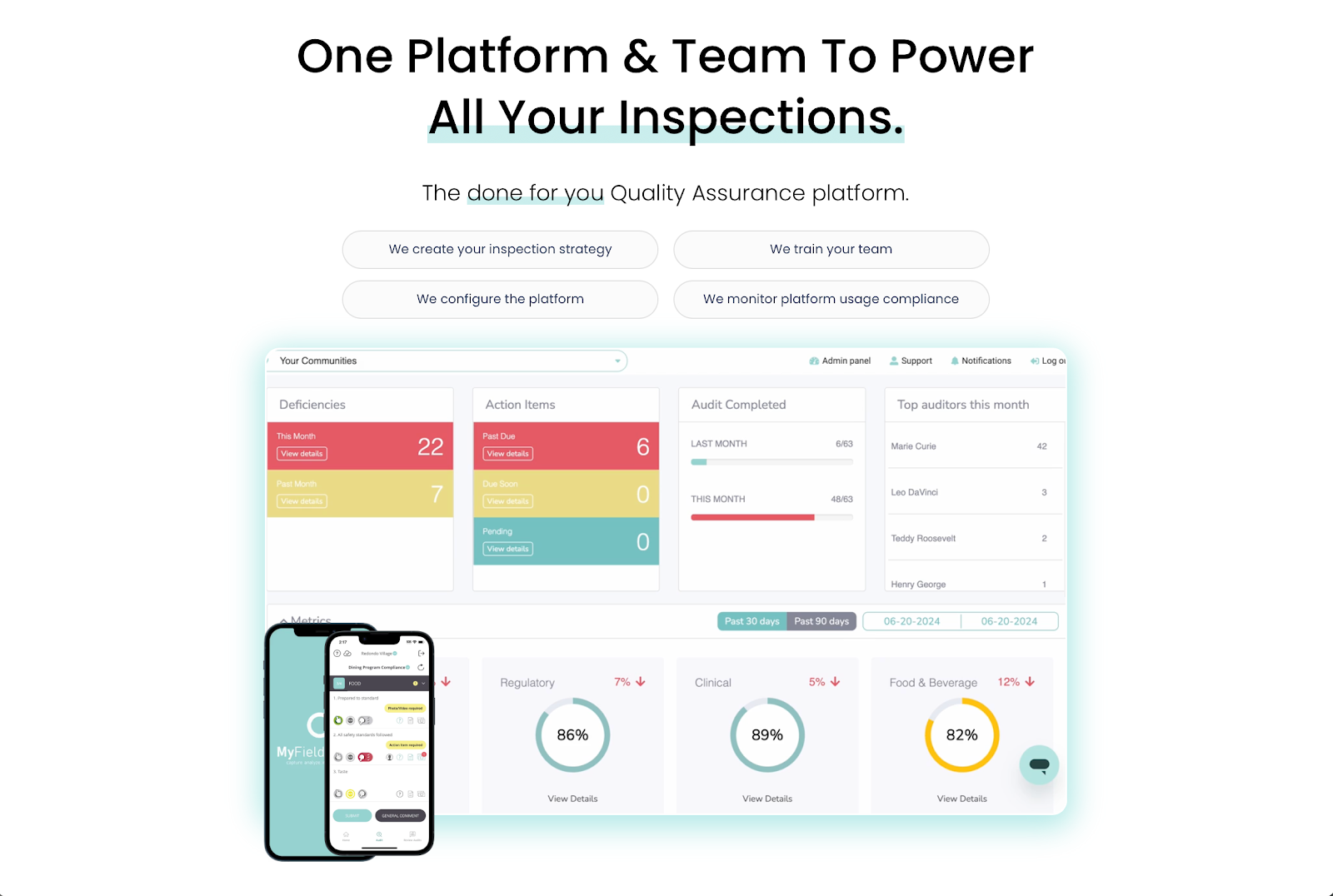
MyFieldAudits offers a fully managed inspection and compliance management platform designed for enterprise-level food businesses.
It lets you capture photos, videos, and real-time data in a mobile software solution that syncs with the desktop app.
The platform also offers scheduling tools, corrective actions, and real-time dashboards to help you track food safety compliance.
Not only does MyFieldAudits give you access to food safety and compliance tools, but it also handles the entire lifecycle of on-site inspections, from mobile field execution to real-time reporting.
The experts behind MyFieldAudits can even develop tailored inspection strategies and provide training for your team. This lets you focus on capturing the critical business data that drives operational excellence.
Key Features:
- Advanced platform: Accessible via desktop or mobile, this food safety app supports real-time data capture, audit scheduling, and compliance tracking.
- Customized solutions: MyFieldAudits works closely with you to understand your specific operational challenges. Experts will then create tailored inspection strategies that address your unique pain points.
- Dedicated support: You can enjoy extensive support from MyFieldAudits, including training, platform configuration, and QA program deployment.
- Enterprise-level focus: Designed for large organizations, not individuals or those seeking off-the-shelf solutions.
For businesses handling contract food service or large-scale food production, MyFieldAudits takes the complexity out of compliance tracking by managing the entire inspection process.
Instead of struggling with manual paperwork, you can focus on operational improvements and risk prevention.
Book a demo today, or watch this video to learn how MyFieldAudits handles the heavy lifting for you!
2. Restaurant365 for Restaurant Management
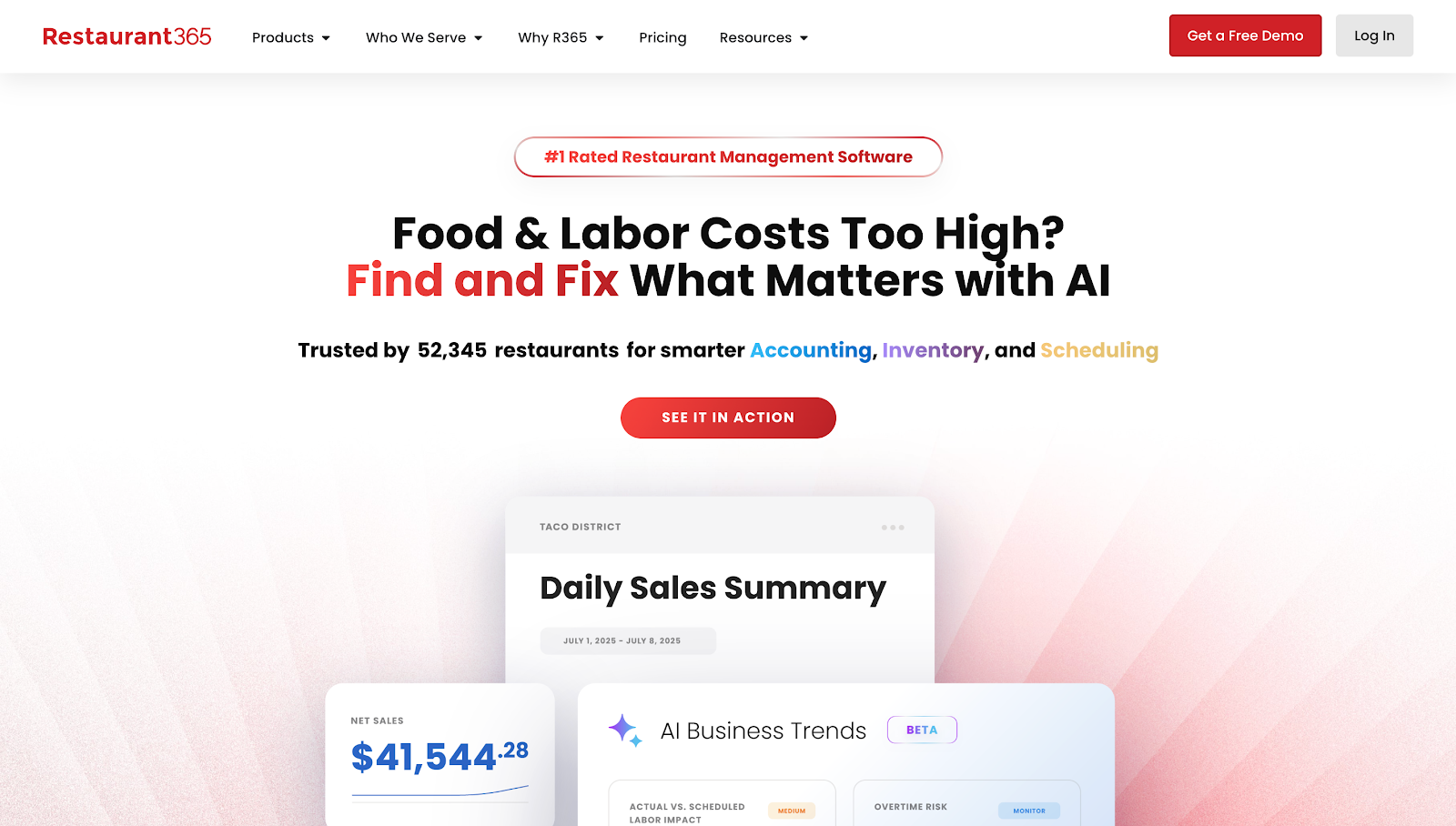
Restaurant365 combines accounting, payroll, scheduling, and reporting in a single platform to streamline operations.
It integrates with POS systems, suppliers, and banks to automate financial tracking and sales processes. This reduces accounting errors and saves time.
Restaurant365 also has a built-in workforce management module. It helps food and beverage businesses handle employee scheduling, labor forecasting, and payroll processing.
Key Features:
- Accounting integration: The software connects directly to bank systems, POS systems, and accounts payable for faster transactions.
- Workforce management: Within Restaurant365, you can handle staff scheduling, predict labor costs, provide relevant training materials, and manage payroll.
- Cash flow tracking: Automate cash counting and reconciliation to avoid human errors and theft.
- Tip automation: The platform automatically calculates tips and tracks top-performing employees.
3. Craftable for Food Inventory Management
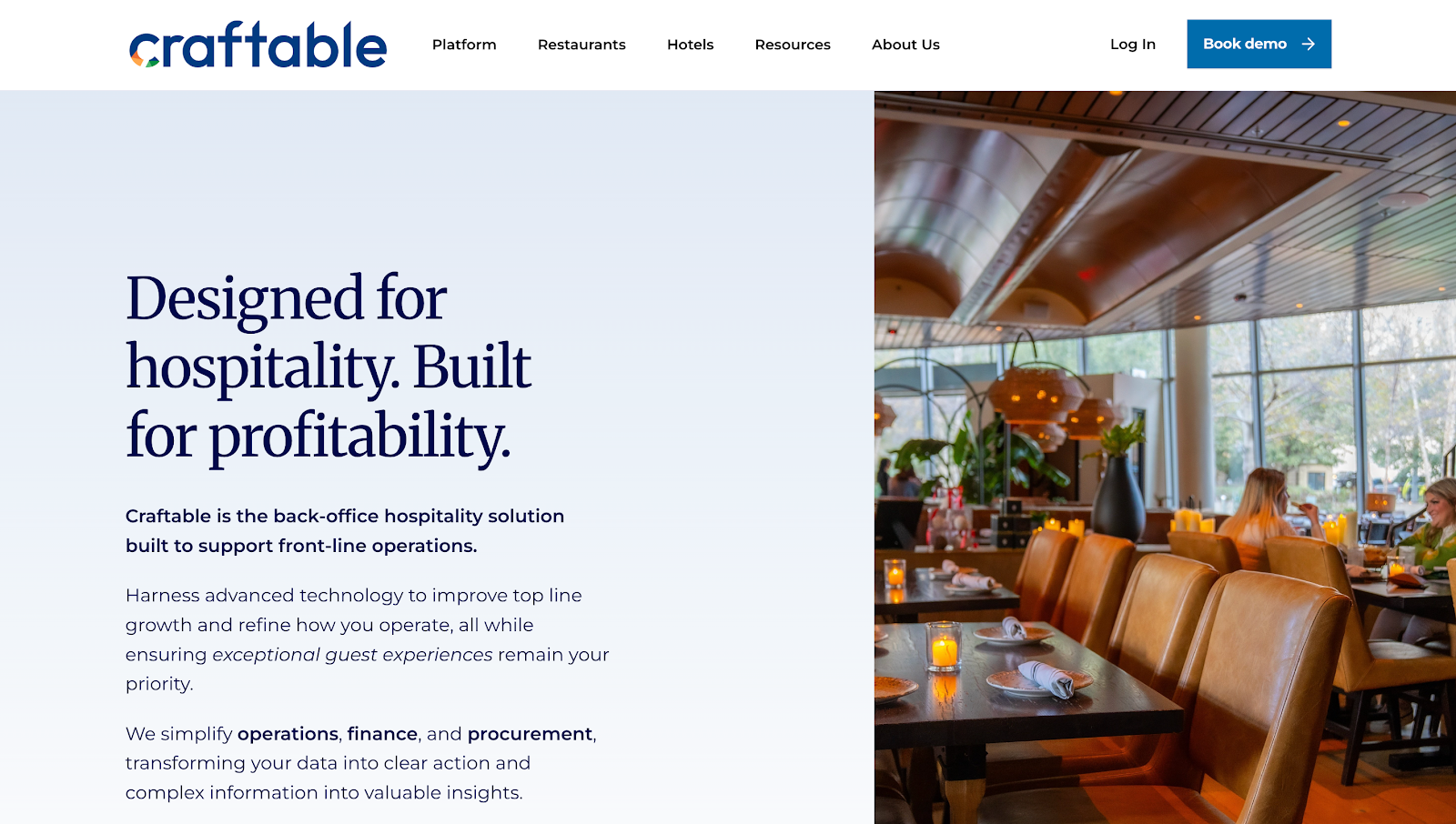
Craftable simplifies stock management by providing real-time inventory tracking, automated ordering, and cost-control tools.
It helps restaurants and bars track ingredient usage, monitor shelf life, prevent waste, and optimize purchasing.
Craftable also integrates with vendor and accounting software. This reduces manual data entry and human errors while improving payment times.
Key Features:
- Inventory tracking: Monitor stock levels and expiry dates of raw materials and other perishable inventory items to reduce food waste.
- Cost analysis: Analyze ingredient costs and calculate potential profit for every plate served.
- Built-in integrations: Craftable's cloud software seamlessly connects to POS and accounting software solutions.
- Real-time analytics: These provide real-time insights into your food business operations to support data-driven business decisions.
4. Foods Connected for Supply Chain Management
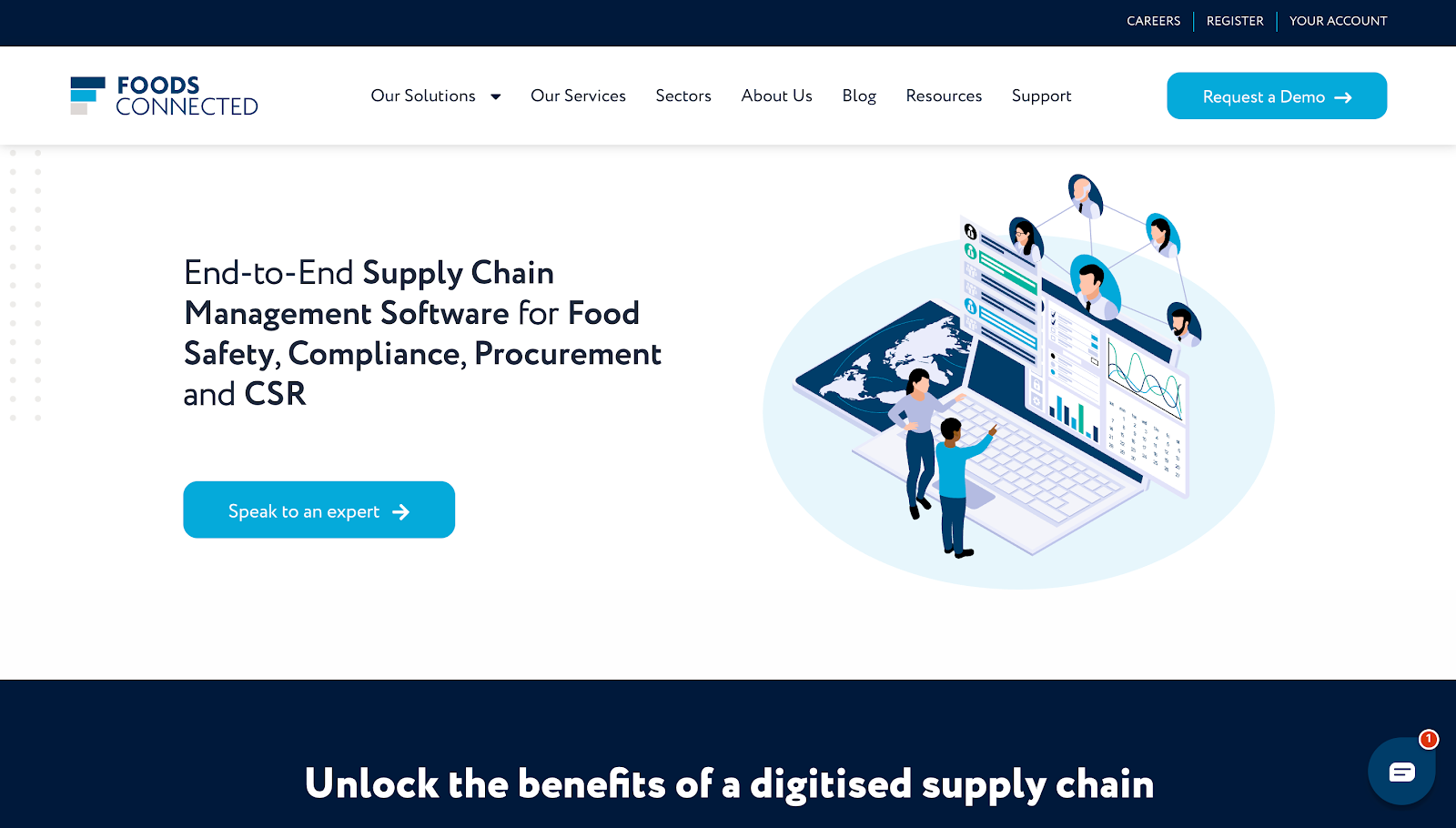
Foods Connected helps you manage suppliers, track shipments, and monitor costs in one platform. It provides total visibility of the entire supply chain, from sourcing to delivery.
The software can also analyze supplier performance, reduce risks, and improve cost efficiency.
Plus, it supports corporate social responsibility (CSR) tracking. This guarantees ethical and sustainable food sourcing, which helps reduce your company's environmental footprint.
Key Features:
- Supplier and contract management: Use supplier approval lists, risk assessments, and digital documentation tools to oversee contracts with food partners.
- Shipment tracking: Monitor food manufacturing processes from farm to fork.
- Cost analysis: Plan budgets more effectively using real-time data on food and supplier costs.
- CSR management: Ensure responsible and sustainable sourcing by tracking animal welfare, packaging, food waste practices, and energy consumption.
5. Inecta for Enterprise Resource Planning
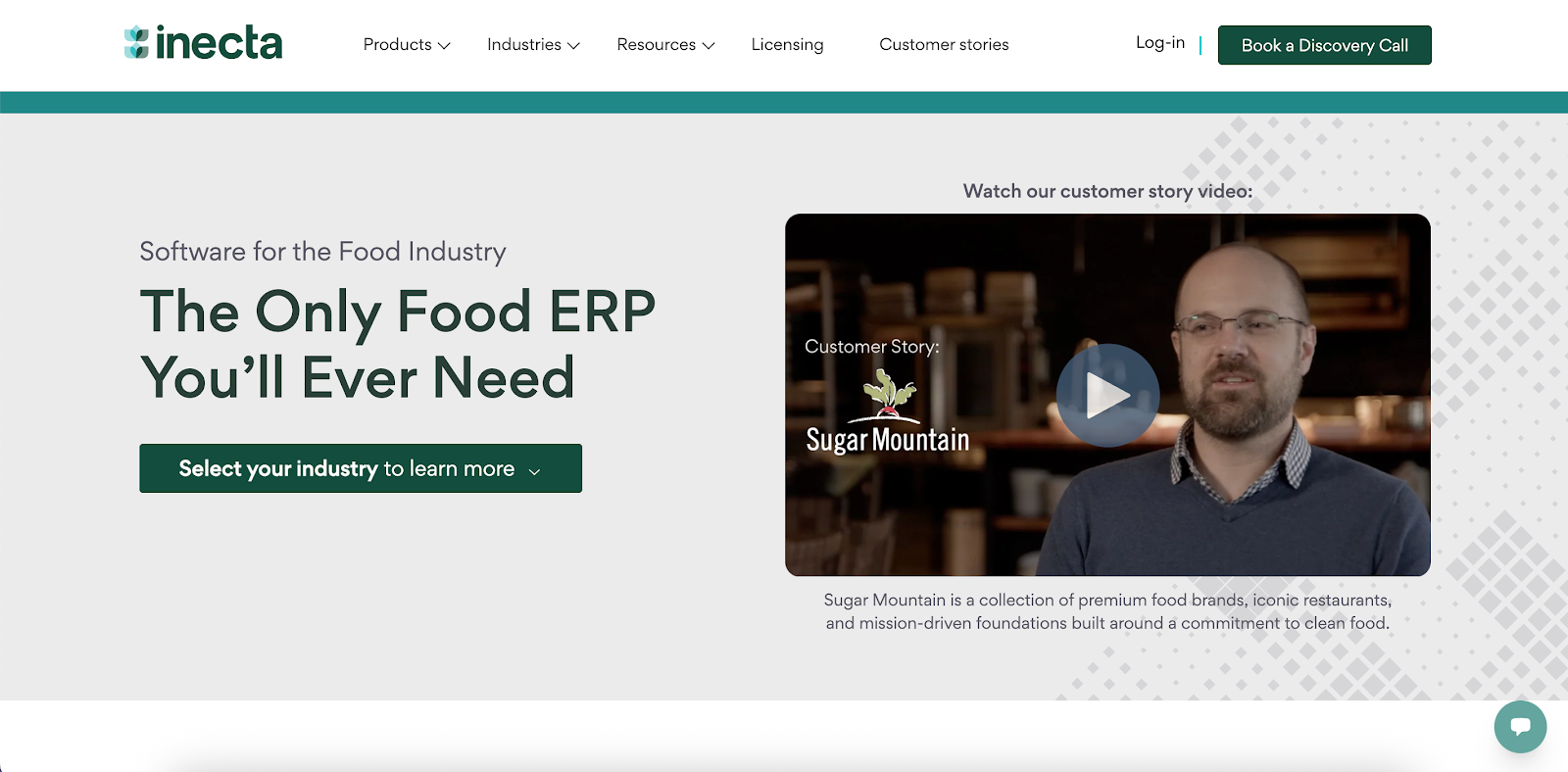
Inecta is a top ERP software solution built specifically for the food industry. It seamlessly connects finance, inventory, production, supply chain, and quality management into a single platform.
It can also automate processes to ensure food safety, quality, and compliance. This helps you maximize profits by reducing waste and improving employee efficiency.
Inecta even integrates with Microsoft Dynamics 365 Business Central. This provides a seamless experience for mid-sized and large-scale food operations.
Key Features:
- Financial management: Manage accounts receivable and payable in one place to help you make smarter financial decisions.
- Inventory and supply chain tracking: Track the movement of food items as they go through the supply chain.
- Reporting and analytics: Stay ahead of issues and identify areas of improvement when you monitor daily operations in real time.
- Mobile app: Gain easy access to Inecta anywhere and anytime using any Android device.
Ensure Food Safety and Compliance with MyFieldAudits
Food safety is non-negotiable. However, manually keeping up with regulations, audits, and inspections can be overwhelming.
MyFieldAudits offers a fully managed quality assurance platform to simplify food safety and compliance across multiple locations.
It features custom inspection forms, real-time dashboards, automated compliance alerts, and corrective actions. This helps your food business meet regulatory standards without relying on spreadsheets or chasing people down.
MyFieldAudits also goes beyond traditional food software by becoming your retention engine. Their experts will create tailored inspection strategies, configure the platform, and even provide training to your team.
Schedule a demo today to fix on-site issues and improve food services! You can also watch this product overview for more information about MyFieldAudits.
FAQs About Software for Food Industry
What is SAP used for in the food industry?
SAP Business is an ERP software suite that helps enterprises manage product, finance, supply chain, and compliance in a single system. It caters to different industries, including food, retail, e-commerce, and automotive.
What technology is used in the food industry?
Food companies use AI-powered analytics, cloud-based inventory management, food and beverage manufacturing software, temperature monitoring, and blockchain for food traceability. These technologies help reduce waste, improve food safety, and simplify daily operations.
Many food industry operators also use inspection platforms like MyFieldAudits to monitor regulatory compliance and maintain high standards across multiple locations.
What is F&B software?
F&B software, short for food and beverage software, can help food businesses run more efficiently. It supports tasks like inventory tracking, quality control, order management, and compliance by meeting specific requirements.
What does ERP stand for in software?
ERP stands for enterprise resource planning. It’s a type of food software platform that connects different business functions (finance, operations, and supply chain) into one interface. This eliminates data silos and the need for other systems.
How can software improve product offerings?
Software gives you insights into sales trends so you can adjust product offerings and support advanced planning that matches demand. It also helps track inventory and costs in real time, making it easier to test new items without overstocking.
%201.svg)





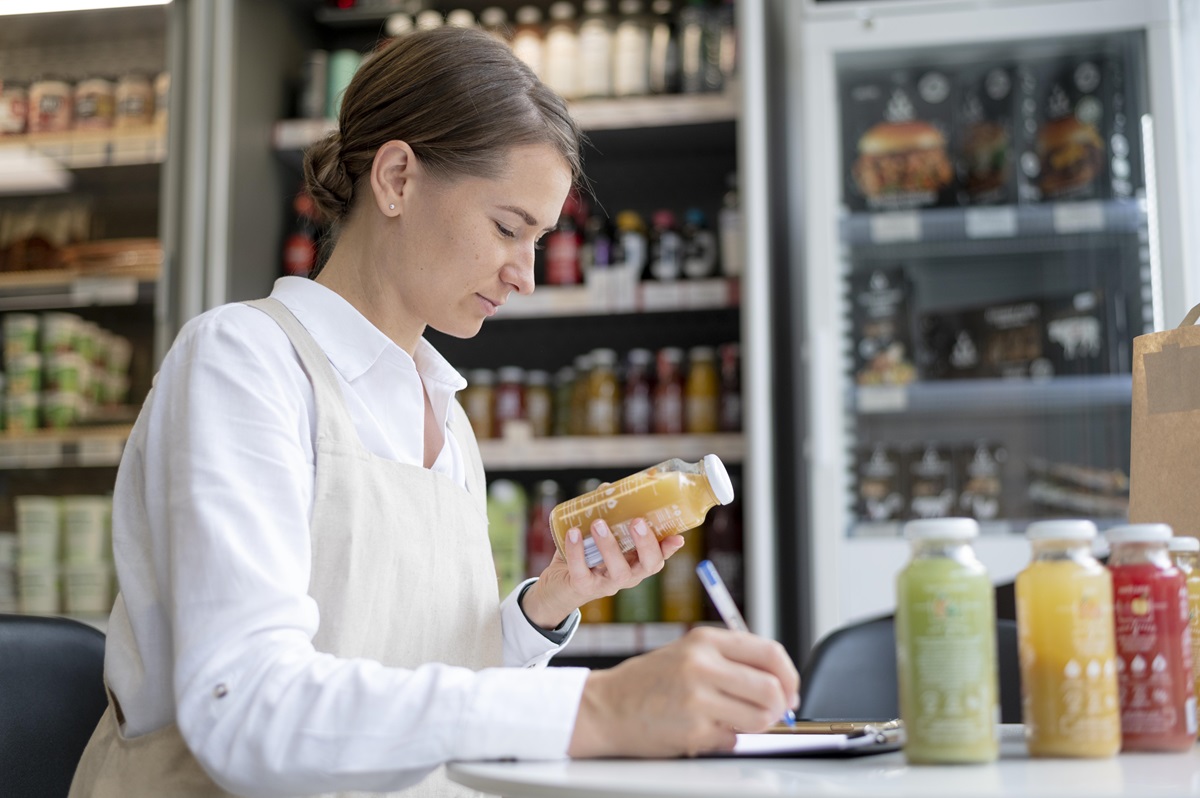
%201%20(1).svg)